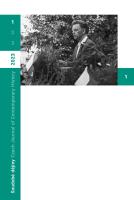"Jak roste nový člověk"
"How a New Man Grows"
Miloš Jakeš as a Regional Communist Official (1945–1952)
Author(s): Matěj BílýSubject(s): History, Local History / Microhistory, Political history, WW II and following years (1940 - 1949), Post-War period (1950 - 1989), History of Communism
Published by: AV ČR - Akademie věd České republiky - Ústav pro soudobé dějiny
Keywords: Miloš Jakeš;Czechoslovakia;Communist Party of Czechoslovakia (CPC);Union of Czech Youth;Stalinism;Gottwaldov/Zlín;collectivization;Baťa Works;National Committees;unified agricultural cooperatives
Summary/Abstract: The article deals with the early phase of the political career of the leading communist functionary Miloš Jakeš (1922–2020), who later became a member of the new “normalization” leadership of the Communist Party of Czechoslovakia (Komunistická strana Československa, KSČ) after the suppression of the Prague Spring and served as its General Secretary from 1987 to 1989. This early era of his life is linked to his work in the Moravian region of Zlín (later renamed Gottwaldov). The author frames his study with Jakeš’s entry into the KSČ in June 1945 and his departure for the Prague Party headquarters in autumn 1952. He first describes Jakeš’s origins in the poor conditions of the South Bohemian village of České Chalupy and his war years at the Baťa Works in Zlín, where he completed his apprenticeship as an electrical engineer. Here, the author pays close attention to the possible influence of Bataism – a specific ethic and way of organizing work – on the formation of Jakeš’s personality. He then describes Jakeš’s rise and activities in the regional structures of the communist youth organisation, the Communist Party and the public administration, where he served, among other things, as a member of the Boards of the District and Regional Committees of the KSČ and as chairman of the United National Committee (Jednotný národní výbor, JNV) in Gottwaldov. Here, the author traces how he contributed to the collectivization of agriculture in the Gottwaldov region after 1948. The author not only attempts to answer questions related to Jakeš himself, such as what brought him to the communist movement, what positions he had in the changing political circumstances and whether he was always a conformist functionary, but he also tries to deepen our existing knowledge on how the new power elites were formed during the establishment and consolidation of the communist dictatorship. In many ways, he argues, Jakeš fit the profile of the new regional party cadres during high Stalinism and embodied the type of functionaries who based their success on adherence to the currently valid official party line, which they tried to put into practice by taking into account the specifics of a particular region. The fact that the head of an industrial urban centre of 50,000 inhabitants was a man of barely thirty years of age, of low social origin, without any significant qualifications or long political experience, illustrates the enormous social mobility in postwar and especially post-1948 (after the communist takeover) Czechoslovakia.
Journal: Soudobé Dějiny
- Issue Year: XXX/2023
- Issue No: 1
- Page Range: 15-67
- Page Count: 53
- Language: Czech

